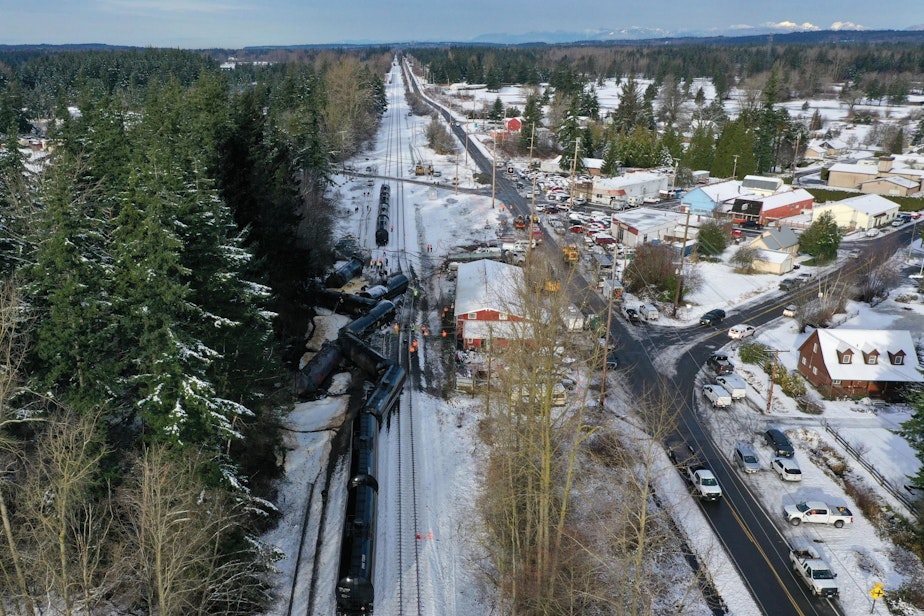Officials demand answers after apparent sabotage of oil train

Some legislators are calling for action in the wake of a federal report on the apparent sabotage of an oil train north of Bellingham last year.
That train derailed and caught fire after it split apart, then slammed into itself. A Federal Railroad Administration investigation published last week found that the train’s brakes and couplers had apparently been tampered with.
Democratic Congresswoman Suzan DelBene says she’s demanding answers from BNSF Railway.
“This impacts all of our communities when there're incidents with a derailment like we saw and the resulting fire,” DelBene said. “This is a safety issue for our community.”
DelBene says members of the Washington congressional delegation will meet with BNSF officials next week to find out how BNSF, the nation’s largest railway company, is going to make its tracks and trains safer.
RELATED: Federal investigation points to 'possible' sabotage of oil train in Custer crash
Sponsored
The Federal Railroad Administration investigation found that BNSF had left a train carrying 3 million gallons of crude oil unattended on tracks outside the town of Custer for three hours, and that the company never told its crews of the dozens of times tracks in the area had been sabotaged in 2020. The investigation also found that two engineers of the ill-fated train failed to check its brakes the morning it derailed.
The federal report echoes the findings of a KUOW investigation published in June.
“We hope that BNSF takes the report seriously,” a spokesperson for Washington Gov. Jay Inslee said in an email. “Obviously this [is] important for the safety and health of communities along the railways as well as for protecting the natural environment along the train’s route,” spokesperson Tara Lee wrote.
BNSF Railway, which is a financial supporter of KUOW, did not respond to an interview request for this story.
DelBene said she expects more answers “soon,” once the FBI completes its criminal investigation of the crash and fire.
Republican state Sen. Doug Ericksen is calling for hearings on the December disaster.
“Legislators need to be aware this is happening, and that the threat is real,” Ericksen said in a press release.
Sponsored
He says the apparent sabotage of the train is part of a larger trend.
“Activism that turns to sabotage invites tragedy. This new trend in left-wing protest warrants the strongest condemnation from elected officials and responsible environmental organizations," Ericksen said. "If this keeps up, it is only a matter of time before someone is hurt or killed.”
He pointed to two Bellingham residents who were recently convicted of tampering with railroad tracks in the area, a felony under federal terrorism statutes.
RELATED Read KUOW's three-part investigation into the train crash:
A jury found Ellen Reiche guilty of violence against a rail carrier on Sept. 9. Her codefendant, Sam Brooks, pleaded guilty in July and acknowledged that the pair had “recklessly endangered the safety of BNSF trains” when they placed a wire "shunt" on the tracks with the intent of delaying BNSF freight operations.
An anonymous communique on an anarchist website in January 2020 called BNSF rail lines “a primo target” for sabotage. The author or authors said they had been attacking tracks in Whatcom County to protest the construction of a natural gas pipeline in British Columbia. They urged others to do the same.
Sponsored
Since January 2020, the FBI’s Joint Terrorism Task Force has investigated at least 41 incidents of wire shunts — which can disrupt track signals and crossing guards — on BNSF tracks in Whatcom and Skagit counties.
“Sabotaging oil trains needlessly puts lives and ecosystems at risk without doing anything to address climate change,” Democratic state Rep. Sharon Shewmake said in an email. “Climate is a systemic problem that needs systemic level actions.”
Bellingham Police and the Whatcom County Sheriff’s Office say they have received no reports of shunts or other track tampering in 2021.




